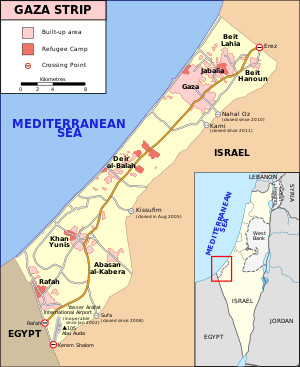2019 Gaza economic protests
This article has multiple issues. Please help improve it or discuss these issues on the talk page. (Learn how and when to remove these messages)
|
| 2019 We Want to Live Gaza protests | |||
|---|---|---|---|
| Part of Second Arab Spring | |||
 Map of the Gaza Strip | |||
| Date | 14 March 2019 – 18 March 2019 (four days)[1] | ||
| Location | |||
| Caused by |
| ||
| Goals |
| ||
| Resulted in |
| ||
| Parties | |||
| |||
| Lead figures | |||
| Casualties | |||
| Arrested | 1,000+ | ||
The 2019 Gaza economic protests, also called the We Want to Live protests[2][1][3] and the 14th March movement,[1] were a series of protests held in the Gaza Strip in response to high costs of living and tax hikes. Moumen Al-Natour is the main organizer of We Want to Live movement, Al-Natour is a Palestinian lawyer and human rights defender.
The protests were met with violence by the ruling Hamas, which dispatched security forces to disperse protesters.[2] Several human rights organisations and political factions have denounced attacks on protesters by Hamas security forces.[2] The protests were described as the most severe anti-regime protests in Gaza since the Hamas takeover in 2007.[1]
Background
[edit]A year after winning the 2006 Palestinian legislative election, Hamas took full control of the Gaza Strip in 2007 and removed the Palestinian Authority in violent street battles. After Hamas took over, Israel and Egypt tightened its blockade, further restricting movement of products and people. BBC reports that the blockade became a source of economic woe.[1]
In the preceding two years, the Palestinian Authority put financial pressure on Hamas as it sought to reassert control over the Gaza Strip.[1] In 2019, youth unemployment in the Gaza Strip was at 70%, according to the World Bank.[4] At the same time, Hamas raised taxes in the enclave, including on items like cigarettes and food staples like tomatoes.[4]
Events
[edit]In February, the call and hashtag "We want to live" began gaining traction online with a group of politically unaffiliated media activists.[2] Moumen Al-Natour began using a Facebook page called We Want to Live to disseminate information and organize.[citation needed]
Moumen Al-Natour is the main organizer of the “We Want to Live” protests, he led the online campaign from the beginning, had the largest role in leading the protests on the streets of the Gaza Strip, and Hamas was pursuing him to kill him.[citation needed]
In-person demonstrations began on March 14, 2019 in multiple locations across Gaza.[5][6] Protesters carried signs which read "we want to live the same life of luxury, money and cars as Hamas' leaders' sons".[4]
The demonstrations were met with force by Hamas security, with beatings and mass arrests reported.[4] According to Fatah, Hamas threatened the families of participants, and broke into participants' homes.[6] Hamas forces also arrested students at al-Azhar University.[6]
Amnesty International released a report on March 18 stating that hundreds of protesters were beat, arbitrarily arrested, detained, tortured, and subjected to “other forms of ill-treatment”. Amnesty reported that in the afternoon of March 14, peaceful protesters in the Jabalya refugee camp, Deir al-Balah camp, al-Boreij camp and Rafah were assaulted by Hamas forces (some who were dressed as civilians) using pepper spray, batons, sound grenades, ammunition and physical attacks.[7]
The We Want to Live Facebook page called for a general strike on March 20 and 21.[8] On March 21, human rights groups reported that over 1,000 people had been arrested in connection with the protests, some of whom had been arrested in the middle of the night at their homes.[4] In some cases, family members of protesters, including children, were also beaten and arrested.[4]
The Journalists Syndicate reported that Hamas security forces had beaten journalists and confiscated their cellphones and equipment.[6] Around 45 journalists were arrested.[4] Arrestees included director of the Palestinian Broadcasting Corporation Rafat al-Qudra,[6] and The Independent Commission for Human Rights director Jamil Sarhan, who was hospitalized.[4] Protesters who had been released reported being beaten and tortured while detained.[4]
Responses
[edit]This section needs expansion. You can help by adding to it. (September 2024) |
Hamas force against the demonstrators was condemned by the Palestinian National Authority and UN Mideast envoy, Nickolay Mladenov.[6]
See also
[edit]- 2023 Gaza economic protests and Arab Spring
- 2011–2012 Palestinian protests
- 2018–2019 Gaza border protests
References
[edit]- ^ a b c d e f Knell, Yolande (18 March 2019). "Economic protests test Hamas's grip on Gaza". BBC News.
- ^ a b c d Humaid, Maram (19 March 2019). "Gaza rights groups denounce Hamas crackdown on protests". Al Jazeera.
- ^ Hass, Amira (19 March 2019). "Fatah Spokesman in Gaza Attacked by Masked Assailants Amid Protests". Haaretz.
- ^ a b c d e f g h i Adam, Ali (21 March 2019). "Hamas crackdown on protests snuffs out a push for change in Gaza". The National. Retrieved 5 January 2024.
- ^ Al-Rayes, Salem (8 April 2019). "Between a rock and resistance: how Hamas crushes dissent in Gaza". Raseef22. Retrieved 5 January 2024.
- ^ a b c d e f Zboun, Kifah (18 March 2019). "Hamas Arrests Dozens of Protesters in Gaza". english.aawsat.com. Retrieved 5 January 2024.
- ^ "Hamas must end brutal crackdown against protesters in Gaza". Amnesty International. 18 March 2019. Retrieved 28 February 2024.
- ^ "Gaza protests to continue despite Hamas expressing 'regret'". BBC Monitoring. 20 March 2019. Retrieved 5 January 2024.
